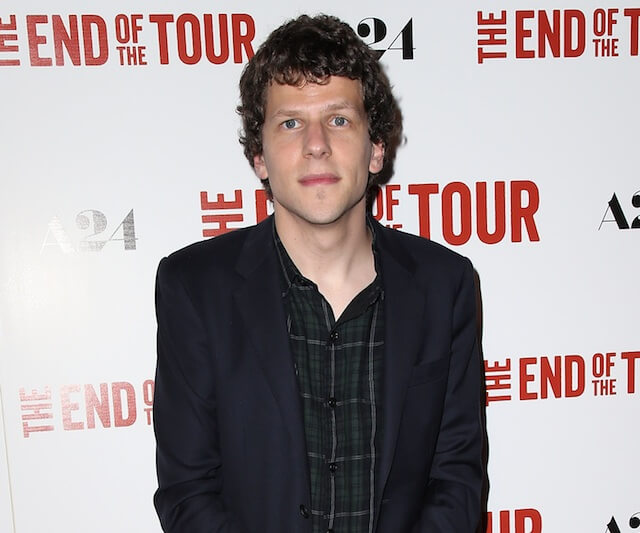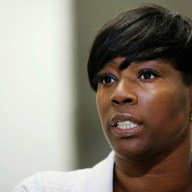Jesse Eisenberg tends to play characters who are shy (“Roger Dodger,” “Adventureland”) or passive-aggressive (“The Squid and the Whale,” “The Social Network”). In real life he’s definitely the former. During some of our interview, the actor curls up on the couch, his head resting on the arm, quietly but assuredly discussing his role in “The End of the Tour.” That film reverses what we’re experiencing; based on David Lipsky’s “Although of Course You End Up Becoming Yourself,” it recreates the few days the author-journalist spent with the late David Foster Wallace after the release of his doorstop of a masterpiece, “Infinite Jest.” Eisenberg plays Lipsky to Jason Segel’s Wallace, playing both confidant and aggressor — a standard relationship during interviews. This is drawn from Lipsky’s transcripts, meaning you’re saying things that were really said. But structurally the scenes capture the feel of real, long conversations, with asides and digressions. How did you achieve that looseness? There was very little planned. We didn’t have rehearsal, and I didn’t personally think of anything as a climactic moment. Nothing felt explicit in the script. That’s good for actors. You don’t feel necessarily beholden to a structure. You treat it as it comes to you. Having no rehearsal means the dialogue could potentially sound fresh — like you’re saying the lines for the first time.
That’s how I did it. I really like doing that. With this movie I didn’t like saying the lines until we were filming, because my character’s not as verbose as the other character. I didn’t feel the need to rehearse my dialogue. It was more emotionally potent to not do anything until the camera was rolling. You don’t have that luxury in movies, really, because you have to rehearse in order to set technical things up. But with this we did have that. It was just the nature of the shoot being quiet and a director who was pretty comfortable allowing us to be more flexible. Did you find that you were discovering things about Lipsky as you went along?
Exactly that. When I first met James Ponsoldt I told him I didn’t want to play the version of the character who’s like the kid brother. He said, “What else is there?” I said, “Well, he’s a sniper. He’s going in there with an agenda.” Once we thought of that I was able to find those moments not only in Donald Marguiles’ wonderful script but in the subtle interplay that happens on set. One of the main ideas in the film is meeting someone one admires and finding them to be pretty normal.
Normal, or maybe even more specifically not happy with the achievements you think you’d be happy with. I think, if I could just achieve the success he has I would be happy. And I see he’s still unfulfilled. Not only is he unfulfilled but he seems almost terrified. I think, oh goodness — in terms of my own trajectory or ascendance, it seems hopeless. You’re playing a journalist. Had you ever interviewed someone before?
Mm-hmm, no.
It’s an odd and unnatural form of communication because the interviewer needs to have an angle. And here, your character definitely has one. He’s trying to get Wallace to disclose about something very personal. It creates a lot of dramatic tension, but it’s also an understandable and sympathetic position to be in. My character is also struggling, also has a job to do. And Wallace agreed to the interview. When he becomes resistant, my characters tells him he agreed to the interview, so you haven’t earned the right to become suddenly resistant on your own terms. You knew what the deal is. You can see it from both perspectives. Certainly as an actor being interviewed for things like this, I can see it from both perspectives as well. You try to be forthcoming, so the person writing the story can reasonably and comfortably write something. But you obviously have an allegiance to some kind of self-protection. Wallace has a line where he says he wishes he could shape the impression your character has. Do you feel a certain anxiety in how other people will present you?
Yes, of course. It’s unnerving. The best thing to do is not try to micromanage something that’s unmanageable, which is how you are perceived by strangers. If you do interview by virtue of it being part of the job, to promote the movie that they paid you to do, then you try to do as much as you can to protect yourself while still talking enough about the movie and yourself to warrant the interview. I don’t want to assume you were a big Wallace fan already, but what was your experience with him?
I read him in college initially, in a non-fiction class. We were reading some of his essays, like from “A Supposedly Fun Thing I’ll Never Do Again.” Once I was in this movie I started reading a lot more, obviously. I particularly love his non-fiction, where he writes about aspects of culture and interpersonal dynamics in ways that come at it from unusual angles. How long did it take you to read “Infinite Jest”?
I started it for this, and it became an impossibility. I needed to set aside a long time, which I didn’t have with this movie. So I’m doing it retroactively.
Jesse Eisenberg on ‘The End of the Tour’ and not finishing Infinite Jest

Getty Images
Follow Matt Prigge on Twitter @mattprigge


















